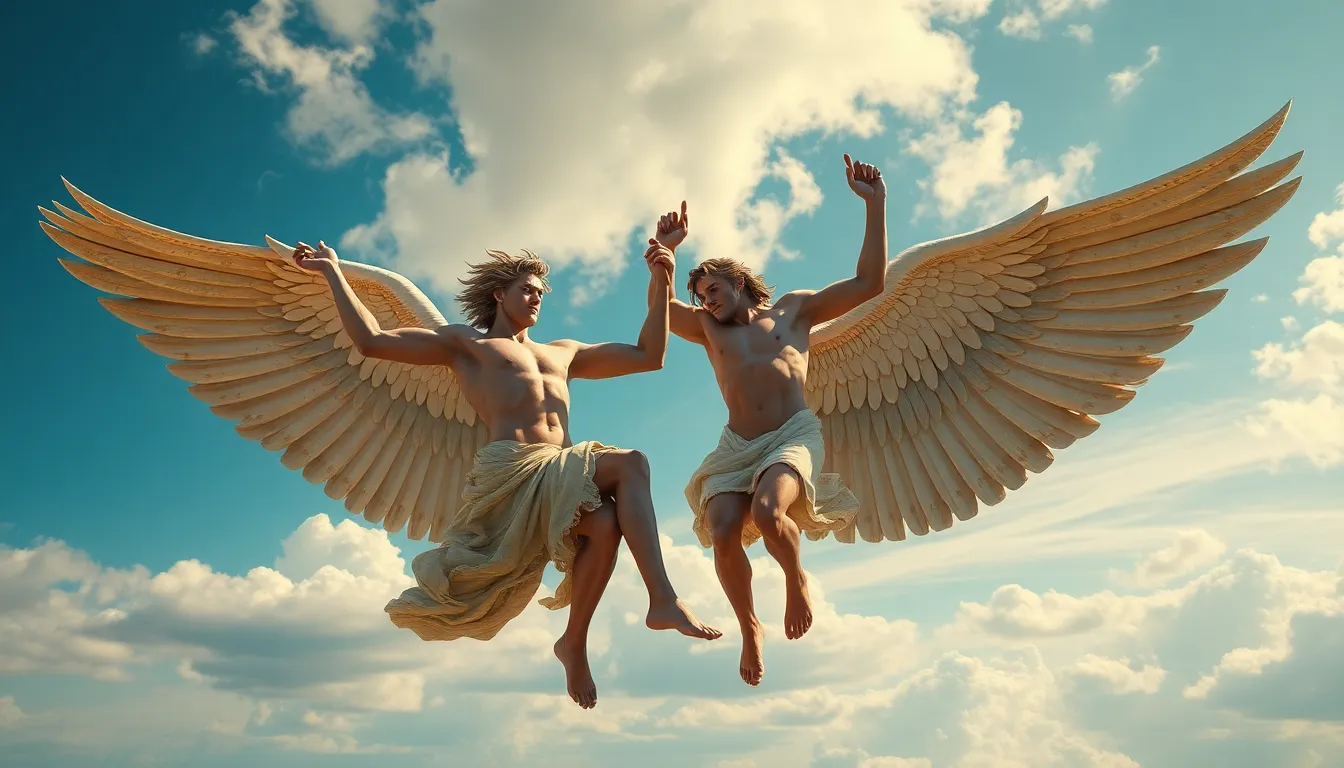Daedalus and Icarus: The Father-Son Duo That Captivated Generations
I. Introduction
The myth of Daedalus and Icarus is one of the most poignant tales from Greek mythology, embodying the themes of ambition, creativity, and the tragic consequences of hubris. This story of a father and son has resonated through the ages, captivating the hearts and minds of those who encounter it. It serves as a cautionary tale about the balance between aspiration and caution, revealing deep truths about the human condition.
In this article, we will explore the origins of Daedalus and Icarus, their relationship, the fateful escape from Crete, and the broader cultural impacts of their story. The narrative of Daedalus and Icarus not only highlights the brilliance of human invention but also serves as a stark reminder of the perils that accompany unchecked ambition.
II. The Origins of Daedalus
Daedalus, a figure celebrated as a master craftsman and inventor, is a central character in Greek mythology. His name translates to “the skillful one,” which aptly describes his remarkable talents in architecture and engineering.
- Master Craftsman: Daedalus was renowned for his innovative designs and creations. He was the architect behind the Labyrinth of Minos, a complex maze designed to contain the monstrous Minotaur.
- Inventive Genius: His ingenuity extended beyond architecture; he also created various tools and mechanisms, including the famous wooden cow, which helped Queen Pasiphaë conceive the Minotaur.
- Exile and Redemption: Daedalus’s life was marked by exile, as he fled Athens after a tragic incident involving his nephew, whom he accidentally killed out of jealousy.
III. The Birth and Character of Icarus
Icarus, the son of Daedalus, is often depicted as a young man full of ambition and zest for life. His character is a blend of youthful exuberance and a desire to prove himself.
- Personality Traits: Icarus is characterized by his adventurous spirit and a longing for freedom, traits that ultimately lead to his downfall.
- Father-Son Dynamic: The relationship between Daedalus and Icarus is central to the myth. Daedalus loves his son and seeks to protect him, but there is an underlying tension between the father’s caution and the son’s desire to explore his limits.
IV. The Escape from Crete
Daedalus and Icarus found themselves imprisoned on the island of Crete by King Minos, who sought to keep Daedalus from revealing the secrets of the Labyrinth. Faced with the dire situation, Daedalus devised a brilliant plan to escape.
- Imprisonment Context: Daedalus was trapped in a tower, with no hope of escape by conventional means, prompting him to rely on his creative genius.
- Ingenious Wings: Daedalus crafted wings made of feathers and wax, allowing him and Icarus to fly away from their captivity.
- Emotional Weight: This escape journey was fraught with emotion, as it represented both a physical departure from captivity and an emotional leap into the unknown.
V. The Warning and the Flight
As they prepared to take flight, Daedalus imparted crucial advice to Icarus, urging him to heed caution during their escape.
- Daedalus’s Warning: He instructed Icarus not to fly too close to the sun or too low to the sea, emphasizing the importance of moderation.
- Symbolism of Flight: The act of flying symbolizes ambition and the human desire to transcend limitations, but it also serves as a reminder of the potential for downfall.
- Icarus’s Defiance: Caught up in the exhilaration of flight, Icarus disregarded his father’s warnings, embodying the youthful recklessness that often accompanies ambition.
VI. The Fall of Icarus
The tragic descent of Icarus is one of the most iconic moments in mythology. As he soared higher, the sun melted the wax holding his wings together, leading to his inevitable fall.
- Tragic Descent: Icarus plunged into the sea, a victim of his own hubris and disregard for his father’s wisdom.
- Themes of Hubris: His fall encapsulates the theme of hubris—excessive pride or self-confidence that leads to one’s downfall.
- Impact on Daedalus: The loss of Icarus profoundly affected Daedalus, who was left to mourn his son and reflect on the consequences of ambition.
VII. Cultural Impact and Interpretations
The myth of Daedalus and Icarus has inspired countless interpretations in art, literature, and modern culture.
- Artistic Representations: Artists such as Pieter Bruegel the Elder and Henry Nelson O’Neil have depicted the poignant moment of Icarus’s fall, highlighting the tragedy and beauty of the story.
- Modern Adaptations: The tale has been referenced in various forms of media, from literature to film, illustrating its continued relevance in contemporary discussions about ambition and consequence.
- Lessons Learned: The myth serves as a cautionary tale about the dangers of overreaching and the importance of heeding wise counsel.
VIII. Conclusion
The enduring legacy of Daedalus and Icarus highlights the complexities of ambition, creativity, and the father-son relationship. Their story resonates with anyone who has ever aspired to greatness while navigating the challenges of life.
In contemporary society, the lessons from Daedalus and Icarus remain relevant, serving as reminders of the balance between striving for success and maintaining humility. Ultimately, the tale of Daedalus and Icarus prompts reflection on the nature of ambition and the bonds that connect us, particularly between parents and their children.




